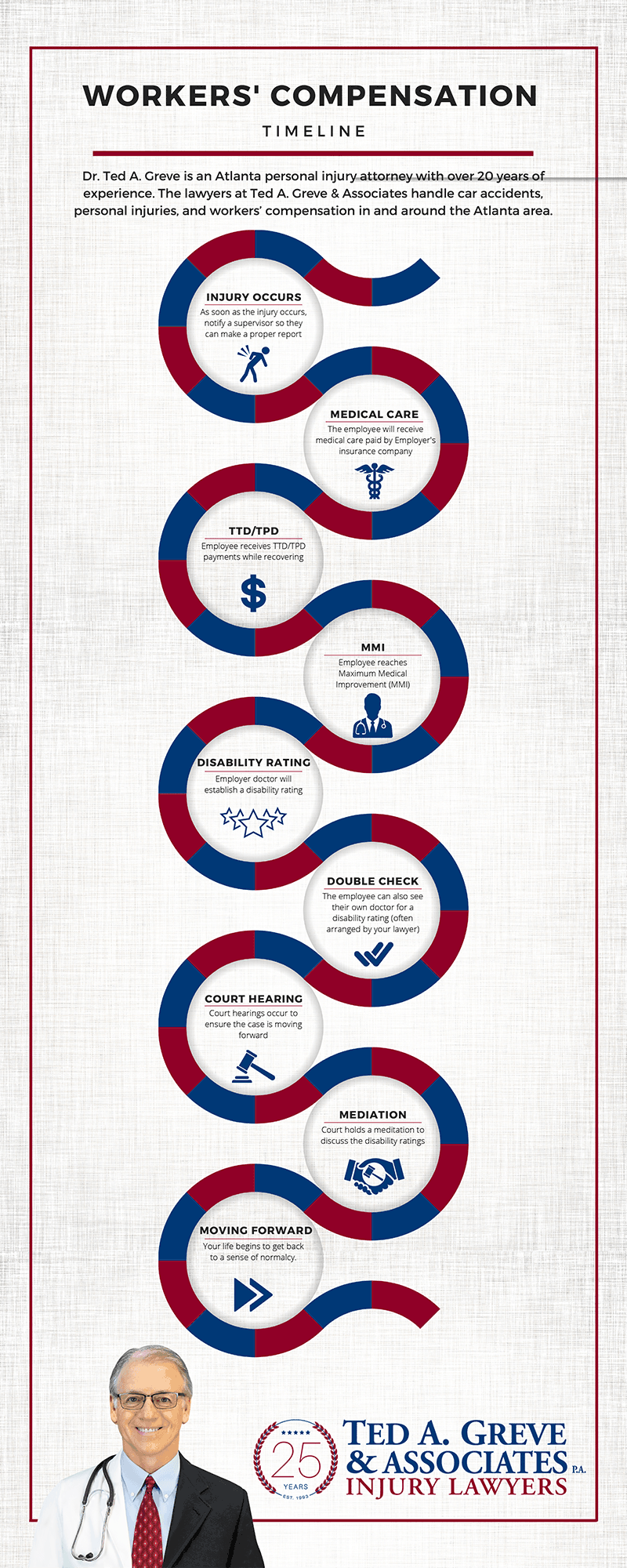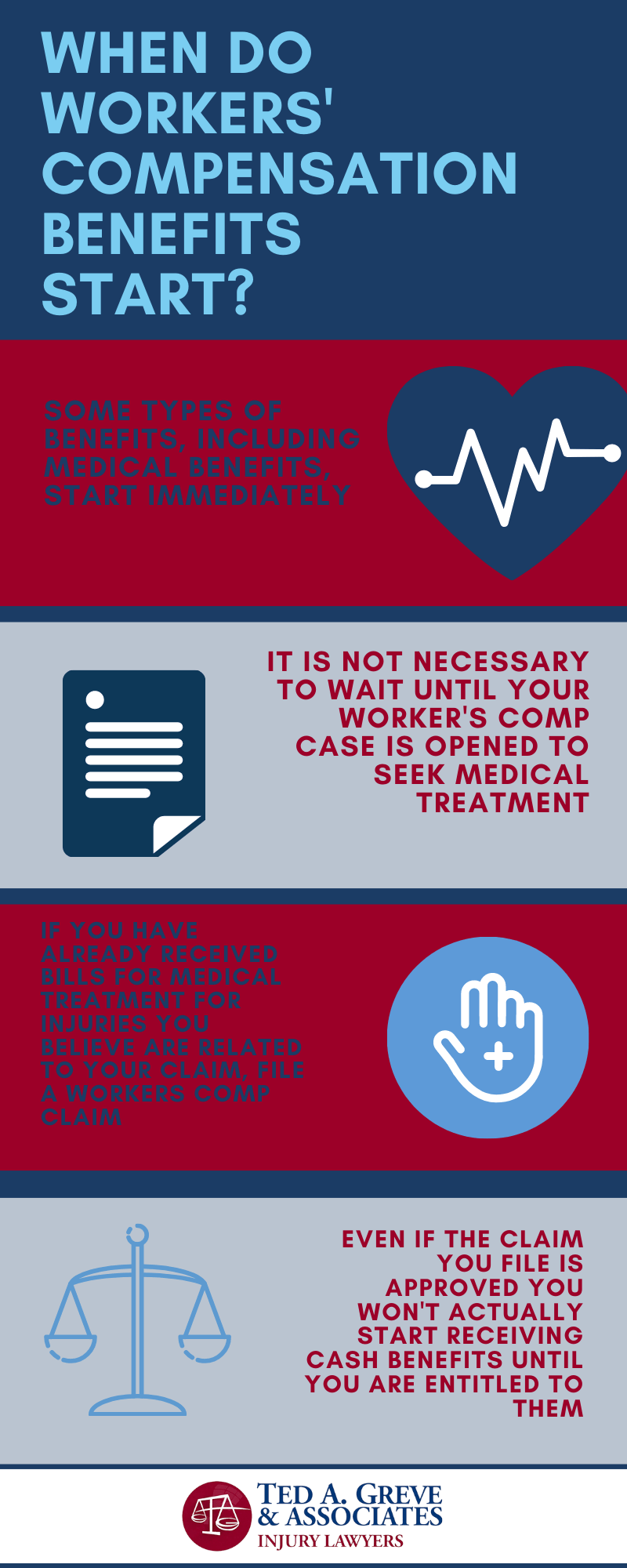Have you suffered injuries in a workplace accident in Georgia? Georgia’s workers’ compensation laws may entitle you to defined financial benefits that can assist with your recovery. Get the experienced guidance and support needed to secure your benefits by contacting Ted A. Greve & Associates PA today for a free initial case review with our workers’ compensation law firm to learn how we can help you pursue your benefits claim.
Understanding Workers’ Compensation in Atlanta
Employees who suffer work-related injuries may have many questions about how the workers’ compensation system works in Atlanta.
What Is Workers’ Compensation and Who Qualifies?
In Georgia, workers’ compensation is an accident insurance program provided by employers to give injured workers necessary medical, rehabilitation, and income benefits after suffering work-related injuries. These benefits help workers heal and return to work. Workers’ compensation can also provide benefits to the families of workers who pass away due to workplace injuries.
All employees who work for compensation qualify for workers’ compensation on their first day of employment with an employer. Workers’ compensation even covers probational, part-time, and seasonal employees.
Employer Obligations for Workers’ Comp in Georgia
Employers in Georgia who regularly employ three or more employees (including corporate officers and LLC members working on the business) must provide workers’ compensation benefits to employees who sustain injuries while working for them.
The Impact of Georgia Law on Claims and Settlements
In cases where a worker suffers severe injuries, including those that lead to prolonged or permanent disabilities, a worker may choose to negotiate a settlement of their workers’ compensation claim. However, Georgia law requires the State Board of Workers’ Compensation to approve all workers’ compensation settlements so that they become valid and binding on workers and employers. SBWC regulations govern the required form and contents of an acceptable settlement.
Hiring the Right Atlanta Workers’ Compensation Lawyer
Hiring a workers’ comp law firm can help you recover from a workplace injury by giving you an advocate who will protect your rights and interests and fight for maximum benefits for your injury.
The Benefits of Professional Legal Assistance in Workers’ Comp Cases
Although employers have a legal obligation to provide workers’ comp benefits to injured workers, some employers may improperly deny claims or seek to terminate workers’ benefits prematurely. Having a workers’ compensation claim lawyer on your side can give you the peace of mind and freedom to focus on your treatment and rehabilitation.
What to Look for in a Qualified Workers’ Compensation Attorney
Working with a qualified Georgia workers’ compensation attorney can improve your likelihood of securing a favorable outcome to your workers’ comp case. Qualities to look for in a workers’ comp lawyer include:
- How long the attorney has practiced workers’ compensation law in Georgia
- What percentage of their practice constitutes workers’ comp cases
- Their success rate in securing benefits and settlements
- How frequently they litigate claims before the SBWC or in court
- Whether they have any certifications related to workers’ compensation law
- Whether they have received awards or peer recognition
Questions to Ask Before Hiring Your Lawyer
Most workers’ compensation firms offer free initial consultations where you can ask questions that may help you decide which firm or lawyer to hire. Questions you should ask before making your decision include:
- How long have you practiced workers’ compensation law?
- How much of your practice consists of workers’ compensation cases?
- How frequently do you obtain benefits or settlements in clients’ cases?
- How often do you appear before the State Board of Workers’ Compensation or in court?
- How often should I expect to hear from you during your case?
- How can I contact you if I have questions? How quickly do you respond to emails, voicemails, and text messages?
- Will you or another attorney handle my case?

Compensation and Benefits: What You Need to Know
Workers who suffer injuries on the job in Atlanta need to understand what compensation and benefits workers’ compensation can provide.
Benefits Available in Georgia
Benefits available under Georgia workers’ compensation law include:
- Up to 400 weeks of medical benefits, which cover the cost of all reasonable and necessary medical treatment and rehabilitation
- Up to 400 weeks of weekly benefits that provide partial reimbursement of lost income
- Permanent disability benefits based on the nature and severity of the disability
- Death benefits that provide weekly payments to surviving spouses and dependent children

Average Settlements and Factors Affecting the Value of Your Claim
The amount of compensation workers who choose to settle their workers’ comp claims may receive will depend on various factors, such as:
- The nature and severity of the worker’s injury or resulting disabilities
- Whether the worker has lost a body part or the use of a body part
- The worker’s pre-injury average weekly wages
- The future medical treatment or long-term disability care the worker will need
- Whether the worker’s permanent condition will allow them to seek other work (including with vocational rehabilitation or job training)

Additional Considerations for Workers’ Comp Claims in Atlanta
The workers’ comp system can be confusing and complex, especially if you’ve never gone through the process of securing benefits after a workplace injury. You and your attorney will likely cover a lot of ground in your initial case review and throughout the process.
The Role of Medical Evidence in Strengthening Your Case
Medical evidence plays a critical role in a workers’ compensation case, including determining a worker’s ability to return to work and their right to disability benefits. Workers may undergo periodic examinations to assess the status of their recovery. Workers who make a partial or complete recovery may return to work, including with restrictions or accommodations for lingering impairments. However, when a worker continues to experience disability after reaching maximum medical improvement, medical evidence will determine the amount of disability benefits the worker receives.
Contact One of Our Atlanta Workers Comp Lawyers Today
After suffering a work-related injury or illness in Atlanta, get legal help to pursue the workers’ compensation benefits you deserve. Contact Ted A. Greve & Associates PA today for a free, no-obligation consultation with a knowledgeable workers’ injury lawyer to discuss your legal options.


